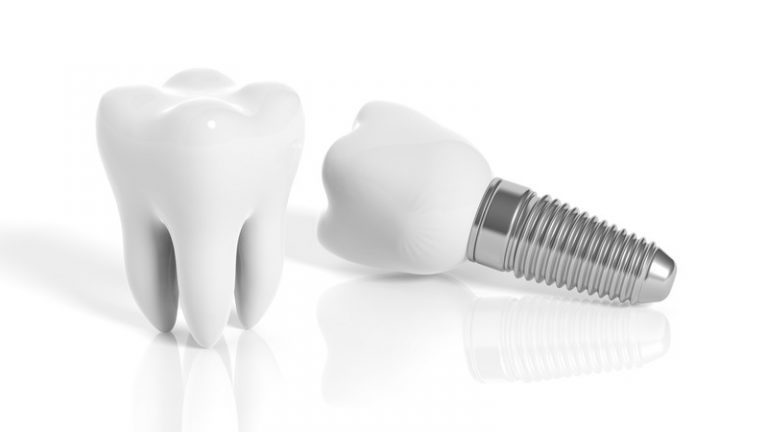Dental implants are the best method for reconstructing a smile; they’re the only truly comprehensive restoration method for missing teeth. Tooth implants offer a permanent solution to tooth loss, and the prosthetic root preserves the health of your jaw. They last a long, long time, and there’s a variety of materials to choose from like zirconium dental implants or titanium replacement teeth. Not to mention, high-quality tooth implants help you regain your smile and your confidence back. They can really transform a person’s outlook on life with how much of a difference a full smile makes.
The biggest obstacle when it comes to dental implants is the jaw health of the patient. When considering whether implants are the right treatment plan for a patient requiring mouth reconstruction, jaw health is the biggest factor. While implants are wonderful at fusing directly with the jawbone and preventing further resorption of the unstimulated bone material where a tooth once was, they’re not always the best option when the jawbone has degraded past a certain point.
Without proper bone structure and density, implants may fail, causing more harm than good. There are always dentures for patients without the bone structure for implants, but ill-fitting dentures can be annoying to deal with, and they don’t offer a permanent solution in the same way implants do. But now there’s an implant option for patients with severe bone loss in the upper jaw: zygomatic dental implants.
What are Zygomatic Dental Implants?
Dental implants will probably always be the golden standard when it comes to missing teeth replacements. Your oral surgeon who specializes in different kinds of dental implants could probably talk your ear off about how great they are for most people.
The actual implant part of a dental implant, in standard procedure, is installed directly into the jawbone at the site of the missing tooth. After the new root is installed in the jaw, over the next few months, the jawbone starts to grow around it in a process called osseointegration. This is a reciprocal process where the jaw bone needs to be healthy enough to integrate the post so that the post can then stimulate and preserve the jaw bone and positioning of other teeth. This is why sometimes, in geriatric oral surgery with patients who don’t have many of their teeth left, standard dental implants might not be the best fit for the current state of their jawbone. An oral surgeon who performs dental bone grafting procedures can help with jawbone reconstruction, but this is actually where zygomatic dental implants come into play.
Zygomatic implants are different because of where the post is placed. Instead of just in the alveolar ridge, the implant is placed partially in the cheek (zygomatic) bone. The healing and integration process is then supposed to progress with a standard prosthetic tooth root. By switching up the area in which the posts are placed, skilled oral doctors can completely circumvent the necessity for a healthy jawbone when offering well-made titanium tooth replacements. While the patient’s jawbone health should still absolutely be addressed in some cases, it’s no longer a hinderance when it comes to receiving dental implants. It’s a win for everyone across the board.
Why Would Someone Need Zygomatic Tooth Implants?
Someone would need a zygomatic tooth implant specifically because of severe bone loss in the upper jaw. Here’s why regular dental implants wouldn’t be ideal in this case:
- Standard dental implants require sufficient jaw bone health. Traditional dental implants rely on being anchored securely in the jawbone (alveolar ridge) for stability and osseointegration (fusion with bone).
- Severe bone loss comes with high risk of implant failure. When there’s significant bone loss in the upper jaw, the alveolar ridge might be too weak or thin to hold a regular implant firmly. This could lead to implant failure or require additional bone grafting procedures.
Dental bone grafting done by an experienced mouth surgeon aids in repairing small areas of the jawbone. Some patients present with severe jawbone loss and are in need of safe and effective tooth replacements. When the alveolar ridge isn’t stable enough to be used in the implant process, the zygomatic bone provides an additional safe area for the implant to take root in.
Zygomatic implants offer a solution because:
- Instead of the jawbone, zygomatic implants are strategically placed in the zygomatic bone (cheekbone). This bone is denser and less prone to bone loss, providing a strong foundation for the implant.
- Since they utilize the zygomatic bone, this type of tooth implant often eliminates the need for separate bone grafting surgery, saving time and potentially reducing discomfort for the patient.
Patients who come into their oral healthcare provider seeking assistance with implants have a new solution. Zygomatic implants save patients with advanced jawbone loss and keeps them away from dentures, which can come with their fair share of issues. Now, all folks who suffer from missing teeth can reap the boosts in self-confidence and oral health that come along with restoring their smile.
Things to Consider with Zygomatic Implants
Just like nearly any kind of operation on the mouth, zygomatic implants do have their drawbacks. It’s not all positive – complications with jaw health have their cost. Things to consider with zygomatic dental implants include:
- More complex/invasive surgery: Placement is a more intricate surgical procedure. This requires a highly skilled maxillofacial surgeon due to the placement of the dental implants.
- Higher risk of complications: Due to the complex surgery and targeting a different bone, there’s a potentially higher risk of complications. These include sinusitis, nerve damage and implant failure.
- Longer healing time: Decreased bone health and increased invasiveness lead to a longer and potentially more uncomfortable recovery time.
- Higher cost: Zygomatic implants often cost more than standard dental implants due to the specialized surgical technique and materials involved.
All that being said, the cost of missing teeth outweighs the challenges associated with the process of getting dental implants. While there might be a handful of drawbacks associated with sticking dental implants in a separate area, the good that zygomatic implants do for folks with missing teeth and impaired jawbone health cannot be overstated. Everyone deserves a happy smile with some top-notch tooth replacements where needed. With permanent prosthetic teeth and a holistic approach to tooth replacement, you can have the smile you deserve even if your jaw health is lacking.
If you’ve been wondering if you can do better than dentures even with severe bone loss in your upper jaw, call us to schedule an exam and consultation with our oral surgeon, who provides dental implant reconstruction for adults, including geriatric oral surgeries.








